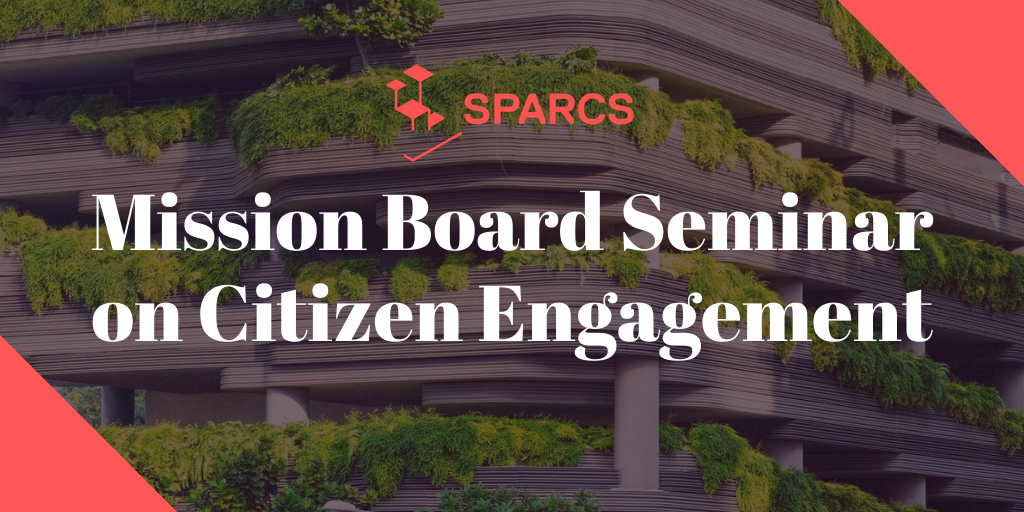Online Mission Board seminar on Citizen Engagement
SPARCS partners VTT Technical Research Centre of Finland, city of Espoo, RIL and GOPA Com. organised an online event about ” Citizen engagement best practices” on March 24th 2020. The seminar was organised in cooperation with the Mission Board on Climate-neutral and Smart City. Other SCC1-projects such as Smarter Together, STARDUST, MAtchUP, MySMARTLife, Trianglum and POCITYF also participated in the coordination of the event.
The purpose of this event was to present best practices and challenges regarding the effort to achieve climate neutrality in cities around the world and to help cities from the H2020 Smart Cities and Community learn from each other.
More than half of the world’s population now lives in urban areas. This is expected to reach 80% by 2050. Cities and metropolitan areas are centres of economic activity, knowledge generation, innovation and new technologies. They impact upon the quality of life of citizens who live and/or work in them and they are major contributors to global challenges.
In order to achieve climate neutrality, it is important both to work towards systemic change and to create urban environments which are creating well-being, and equal opportunities to all. This is why we need a strong engagement of citizens.
Using innovative online tools, we have reshaped this event for the purposes of online attendance due to the travel restrictions around Europe and compressed the agenda to shorter and more dynamic sessions suitable for an online audience so that the participants can fully partake in this event.
At the beginning, participants learned about success stories and challenges of engaging citizens in Smart City Lighthouse projects. The event was opened with welcome words from Helena Kyrki, Manager for Sustainable Development, City of Espoo. The main part of the event began with a presentation by Olli Voutilainen from the Ministry of Economic Affairs and Employment of Finland who spoke about Sustainable cities from digital solutions: Mission-led innovation in Horizon Europe. The European Commission representative Oana-Andreea Melinceanu, brought in the institutional perspective for citizen engagement, Maria Vassilakou, a Board member of Mission of Climate Neutral and Smart Cities, finalized the opening part of the event by presenting on why are citizens important in the transition towards climate neutrality and about the Mission Board objectives.
The event followed up with discussion that was building up contributions towards recommendations for the Mission board based on each participants’ experiences. Contributions to this discussion were given by variety of representatives from different projects:
- Elina Wanne (City of Espoo, SPARCS) spoke about Espoo citizen engagement
- Hans-Martin Neuman (AIT, Smarter Together) presented on Citizen Engagement practices towards climate neutrality
- Maarit Vehviläinen (City of Tampere, STARDUST) shared the view on A model of participation and community in Tampere and example cases for citizen engagement
- Ernesto Fabuel (City of Valencia, MAtchUP) presented about MAtchUP citizens´ engagement strategy
- Maria Viitanen (City of Helsinki, MySmartLife) spoke on the topic of Energy renaissance program: How to facilitate retrofits of housing cooperatives?
- Tomáš Vácha (CVUT) told us about Learning and sharing: capturing the soft aspects in SCC projects
- José Campos Cost (EDP, POCITYF) presented on the topic of POCICYF – Citizen engagement approach for cultural heritage sites
The session continued with comments and questions on priorities, needs, recommendations for effective citizen engagement at all levels and concluded with reflections on the impact of citizen engagement by Mission Board Assembly member Miimu Airaksinen and closing words SPARCS Coordinator Dr. Francesco Reda from VTT.
We saw, how despite the circumstances, participants from the Smart City community came together online to discuss citizen engagement best practices. The diversity of lessons learned and challenges presented at this meeting show that these projects and their partners can work collaboratively and create a knowledge-sharing system that help improve their activities in the area of citizen engagement and could be replicated in other areas, bringing cities closer to achieving their aim of climate neutrality.
The full list of presentations and the video of the event can be found under useful docs.
For further discussion on this and other similar topics, please follow us on our social media accounts.

